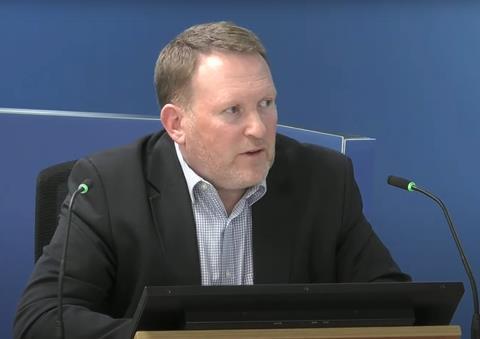Brian Martin told Grenfell Inquiry he “struggles to understand” why he did not take action on preventing a major cladding fire
A senior civil servant has told the Grenfell inquiry that he “struggles to understand” why he did not take action to prevent a major cladding fire.
Brian Martin, who was responsible for guidance on fire safety in buildings for nearly 17 years before the Grenfell fire, admitted that he missed opportunities to address the risks of using deadly ACM cladding in high-rise buildings.
He said it was “something I regret in a way I find difficult to describe”.
The inquiry has heard that Martin was the person in the housing department “to whom everybody turned” for expertise on fire safety in buildings.
Over the past week, hearings have been shown a series of emails from cladding experts sent to Martin in the years before the Grenfell fire warning him of the widespread use of ACM on tall buildings in the UK.
Martin was also repeatedly warned about confusion in the construction industry over an ambiguous passage in building regulations, authored by him and his colleagues, which some interpreted as permitting the use of combustible cladding materials above 18m.

In 2016, he was sent an email from cladding professional Nick Jenkins which warned of “grave concern” that the number of tall buildings in the UK fitted with ACM cladding was “many and growing”.
The inquiry has already heard that Martin responded by saying that fire caused by ACM “shouldn’t be a problem in the UK” because the building regulations were “designed to prevent this”.
On his sixth day of questioning, he was asked by counsel to the inquiry Richard Millett QC why he had not taken Jenkins’ concerns more seriously.
He said: “Over the last few months, where I’ve been looking back through all these documents, I think I’ve recognised that there were things that I could and should have done, and I struggle to understand why I didn’t do them”.
He added that he had been “working in isolation” because of a “progressive reduction in resource” at the housing department, but admitted that this was not an “absolute defence”.
Martin told the inquiry last week that he had “completely underestimated” the hazard posed by ACM and admitted that he would have focused more on the issue if he had “fully understood it”.
Asked yesterday why it took the Grenfell Tower disaster for the dangers of ACM cladding to be fully appreciated, Martin said: “That’s quite a complex question. I’m not sure if it’s for me to answer that in full.”
“Well, for whom else is it to answer, then, if not you?” Millett said.
“Well, I can answer it, but it’s a long answer”, Martin said. “It’s the progressive decay in the construction industry, the progressive decay that went alongside it in the building control world, the impact of government policy on regulation and the resources available to try and address these risks.”
In 2011, three years after Martin had joined the housing department full-time, ministers had introduced what was dubbed a ‘red tape challenge’ where new regulations could only be added if existing ones were removed.
The ‘one in, one out’ policy was strengthened in 2013 to ‘one in, two out’ and to ‘one in, three out’ in 2016.
Martin said yesterday that his team had “really struggled to get anything done” within the department because of the drive for deregulation, which was intended to stimulate the economy in the years after the financial crisis.
“There was a lot of pressure on the team in relation to deregulation”, he said. “Once we got past the 2015 election, we had a combination of an even greater ambition towards deregulation, ”regulation” was a dirty 19 1 word, and there was so much political disruption, it was very difficult to get any kind of traction, and any document that would have gone out from the department would have needed to have had political approval.”
Martin had agreed in 2014 to add a ‘frequently asked questions’ (FAQ) document to fire safety guidance clarifying that ACM and other combustible materials should not be used in cladding systems above 18m.
The FAQ was never published, and ACM was only explicitly banned by the government in December 2018, a year and a half after the Grenfell fire.
Asked if the FAQ would have needed ministerial approval, Martin said: “Absolutely… It’s a document published by the department. Anything like that is politically cleared.”
But he had also not raised the issue of the industry’s confusion over the building regulations with his colleagues.
He said: “I wish I had. I think I probably should have done. I think it’s a combination of factors…It’s difficult to know what was going on in my head at the time.”
Martin faces his final scheduled day of questioning tomorrow. On Wednesday, the inquiry will hear evidence from Brandon Lewis, who held the role of housing minister between 2014 and 2016.
The inquiry continues.











No comments yet